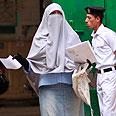
With elections underway, Tahrir remains empty
Once the heart of the revolution, Cairo's Tahrir Square remains free of protesters while disillusioned Egyptians ponder dilemma: to vote or not to vote? Special report from Cairo
CAIRO - There is no better indicator of the emotional climate in Egypt than Cairo's Tahrir Square, a site once jammed with tens of thousands of protesters whose valiant outcry unseated President Hosni Mubarak.
As Egyptians began streaming into the voting stations to choose the country's next leader on Saturday, the heart of the uprising remained almost entirely empty.
Related articles:
- 'Egypt will not turn into another Iran' Egypt's court says parliament is dissolved Egypt debate: Israel enemy or adversary?
"The revolution is exhausted," one activist says.
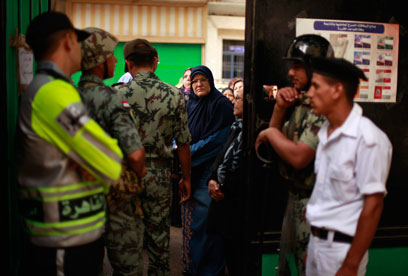
Voters in Cairo (Photo: Reuters)
The fervor that had washed over Egypt during the parliamentary elections and the first round of the presidential poll has dissipated, but tension was palpable on the streets of the capital. Most shop owners have chosen to shut their doors for fear of renewed violence that could be triggered with the announcement of the new president.
Not even the High Court's decision to dissolve the newly-elected parliament was enough draw the masses back to the square; a few scattered rallies were held across the city, but these primarily condemned the court's decision to allow Ahmad Shafiq, a holdover from Mubarak's regime, to run against the Muslim Brotherhood's presidential candidate, Muhammad Mursi.
A year and four months after Mubarak was ousted, Egyptians hoped calm would be restored following the elections.
"Look around you," an activist in Egypt's pro-democracy movement says. "Only vendors and hoodlums have remained in the square. They drive away anyone who wants to protest.
"A women's rally was supposed to be held here a few days ago," he adds. "These thugs began to sexually harass them, and the protest quickly dispersed."
'Elections are fixed'
After a years-long battle, the activist says he does not intend to exercise his right to vote.
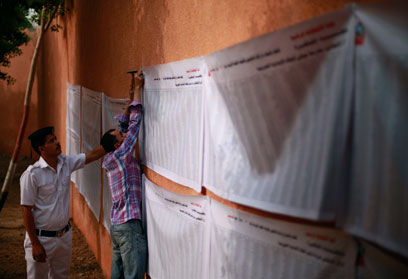
List of voting stations (Photo: Reuters)
"Who can I vote for?" he ponders angrily. "For Ahmad Shafiq, Mubarak's ally, an officer who will perpetuate the reign of the military junta? He represents everything that this revolution fought against. People sacrificed their lives to protest against him.
"On the other hand we have a representative of the Muslim Brotherhood, and voting for him is not an option."
Forced "to choose between the plague and typhus," a vast section of Egyptian voters intends to boycott the elections.
"What would you do if you were me," Muhammad, a father of five, asks. In the previous round of the elections he voted for the Nasserist party, which surprisingly came in third. But now he is left without a candidate. "I'm not going to vote. Neither candidate represents my positions.
"In any case, this election is a farce, whose results have been predetermined," he adds.
Israeli conspiracy?
At a small coffee shop on a side street here in the capital, patrons are reading newspapers and smoking hookahs. On the television, a commentator urges citizens to go out and vote in order "to restore Egypt's sovereignty and get rid of the foreign occupation."
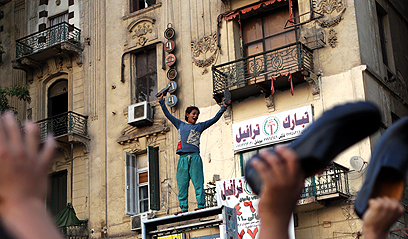
Few rallied against parliament dissolution (Photo: Reuters)
The secular reporter ardently defends the military, and dismisses critics alleging that the army conspires to remain in power.
"The rumors that have been circulating on the Internet are the work of Israeli intelligence agencies," he charges. "The Jews do everything in their power to destroy Egypt, while our army has promised to protect us."
At the coffee shop, his accusations are met with a certain derision.
"They really think we're stupid," one patron says.
But many Egyptians buy into the anti-Israeli rhetoric, spouted by both sides of the political spectrum.
Egyptian television stations have broadcast in recent days a message that warns the citizens about foreign spies who have infiltrated the country with the purpose of destabilizing it.
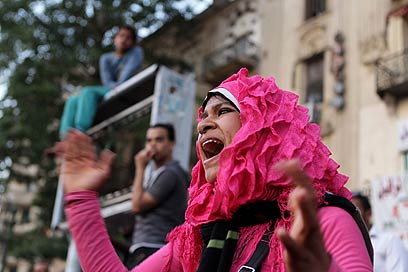
Choice is between 'plague and typhus' (Photo: AFP)
On the streets of Cairo, journalists are often stopped by concerned folk who demand to delete all footage that shows people. In Tahrir Square, this demand is often accompanied by threats issued by the Baltagiya, or gangs of thugs that have overrun the filthy plaza.
Opportunity for new dictator?
Large police forces have been deployed to voting stations to bar unauthorized persons from entering. The absence of long lines of voters, which have characterized the previous elections, points to the dilemma faced by the citizens – to vote, or heed the call to boycott the ballot boxes.
"Maybe this is the calm before the storm," a young opposition activist says. "Maybe the results of the elections will bring the masses out to the streets again. But after 18 months of protests, the people are sick of it. They want to go back to normal life. It's a great opportunity for a new dictatorship. We don't have a parliament or a constitution, and the next president will enjoy absolute authority from the moment the military hands over power.
"Not even Mubarak enjoyed such power."
- Receive Ynetnews updates directly to your desktop










